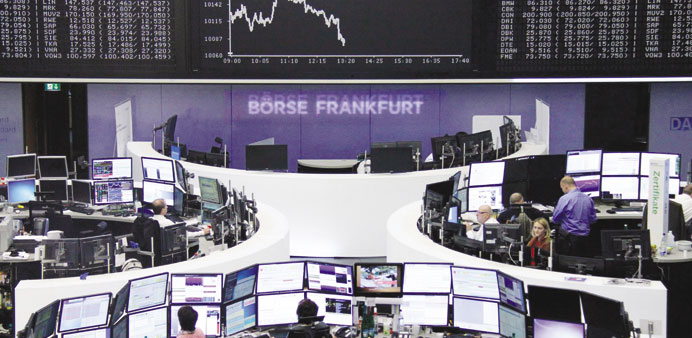Traders work in front of the DAX board at the stock exchange in Frankfurt yesterday. The DAX 30 finished trading 0.39% higher to 10,104.43 points.
AFP/London
European stocks advanced yesterday after a fresh round of gains in Asia, as investors bet the US central bank would keep rates at record lows close to zero for the time being.
Markets were also spurred by hopes that Chinese authorities could unleash more stimulus to counter a slowdown in the Asian powerhouse economy.
London’s benchmark FTSE 100 index ended the day up 0.62% compared with Thursday’s close to 6,378.04 points.
Frankfurt’s DAX 30 finished 0.39% higher to 10,104.43 points and the Paris CAC 40 rose 0.59% to 4,702.79.
In foreign exchange activity, the European single currency slid to $1.1359, from $1.1495 late in New York on Thursday.
While weak readings this week on trade and inflation initially sent stocks lower, investors now see the possibility of another Chinese interest rate cut — after five since November — or other monetary loosening.
US stocks continued to rally yesterday, buoyed by forecast-beating earnings at industrial heavyweight General Electric.
In late-morning trade in New York, the Dow Jones Industrial Average added to Thursday’s 217-point gain another 35.94 points, a 0.21% increase to 17,177.69.
The broad-based S&P 500 rose 0.22% to 2,028.34, while the tech-rich Nasdaq Composite Index climbed 0.23% to 4,881.21.
GE shares jumped 1.36% after the company beat profit expectations with $2.51bn in its third quarter, though it slightly missed on revenues, which declined 1.3% to $31.7bn.
The main story behind the latest rally has been the likelihood the Fed will have to put off a rate hike until the new year owing to a slowdown in world economic growth.
After saying in early 2015 that a rise was expected as the US economy picked up pace, bank policymakers have gradually lowered their expectations, with turmoil unleashed by China’s yuan depreciation in August playing a major role.
A recent run of weak data out of Washington — including below par jobs growth and retail sales — have also muddied the Fed’s waters.
“As the world’s foremost economy, anything which could affect the US market is watched closely by markets elsewhere,” said ETX Capital analyst Daniel Sugarman.
“Raising interest rates leads to higher charges on things like mortgage rates and credit card rates. With less money left to spend, people tend to buy less, which has a knock-on effect on company’s sales figures.
He added: “Any suggestion of a delay regarding a Fed interest rate hike can send stocks surging because it suggests that people will keep buying goods or services at the same rate for the time being.”

